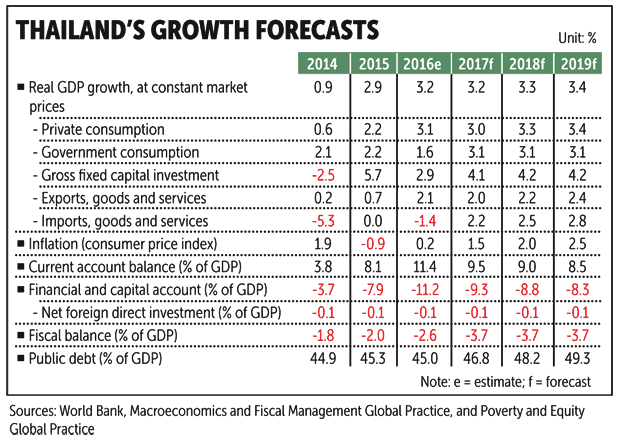Thailand: World Bank keeps wary outlook
The country’s underlying productivity challenges are expected to cap Thai economic growth at a mere 3.4% in 2019, the World Bank says.
The Washington-based lender is maintaining its forecasts for Thai GDP growth of 3.2% this year and 3.3% in 2018, with the rate rising a bit to 3.4% in 2019, according to the World Bank in its East Asia and Pacific Economic Update for April.
“Similar trends are expected to continue in outer years; however, underlying productivity challenges will cap growth at 3.4%, even in 2019,” the report said.
 The World Bank’s estimates are still well below the full growth potential of Southeast Asia’s second-largest economy at 4-5%, and the multinational lender’s prediction for Thai economic growth this year is lower than the Bank of Thailand’s and the Finance Ministry’s growth projections of 3.4% and 3.6%, respectively.
The World Bank’s estimates are still well below the full growth potential of Southeast Asia’s second-largest economy at 4-5%, and the multinational lender’s prediction for Thai economic growth this year is lower than the Bank of Thailand’s and the Finance Ministry’s growth projections of 3.4% and 3.6%, respectively.
The Thai government has offered a series of tax incentives and scaled up public investment to crowd in private investment, aiming to lift the country’s growth to its full potential after sub-par showings since 2013. Consumption should continue to underpin Thai GDP growth, while public infrastructure investment and some structural reforms could help crowd in private investment, the World Bank said.
The report said that since the global financial crisis, total factor productivity (TFP) — a measure of the efficiency with which factors of production are used to produce goods and services — has fallen across East Asia and the Pacific. “Since the global financial crisis, [the TFP] has continued decelerating in China, and remains well below pre-crisis levels in Thailand and to a lesser extent Malaysia,” the World Bank said.
In contrast, TFP growth has returned to pre-crisis levels in the Philippines and Indonesia, and is rising in Vietnam.
The report said that for this region, the reallocation of labour towards sectors enjoying higher productivity, in particular from agriculture towards manufacturing, construction and non-traditional services, is important to support productivity gains.
“However, this transformation has stalled in Thailand, and its pace also remains weak in Malaysia and the Philippines since the Asian financial crisis,” the World Bank said. “Constrained by education attainment and skill levels, a large share of poor workers might not be able to reap the full benefit of job opportunities in the high-end services sector.”
The report said rising crop income in recent years was not supported by higher productivity but rather by higher prices as a result of the global commodity price cycle.
As crop prices fall, growth could become less inclusive, with the rural poor negatively affected, muting improvements in rural living conditions.
Exports are projected to gradually recover across most of the region, but Thailand’s export potential remains limited by continued productivity weakness.
Regarding other challenges for the country in the future, the report said a potential deterioration in the global economy, as well as growing economic, political and institutional uncertainty in response to US policies and upcoming elections in Europe, could weigh on a Thai export recovery.
“Postponing ongoing political reforms could increase political uncertainty and could delay public spending and economic reforms, potentially weighing on consumer and investor confidence,” the World Bank said.
Source: http://www.bangkokpost.com/business/news/1234366/world-bank-keeps-wary-outlook


 Thailand
Thailand




